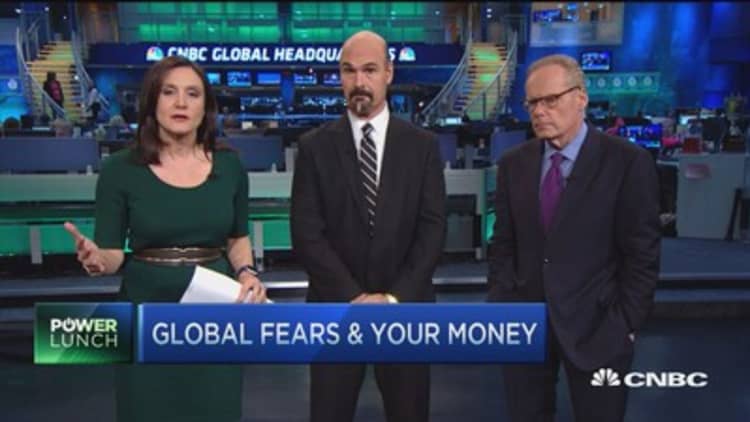
Oil prices rose Tuesday as traders priced in more geopolitical risk after Turkey downed a Russian jet fighter on the edge of Syria.
But the market reaction was more muted in some asset classes more than might be expected, given past responses to geopolitical events. Treasury yields were lower, but there was not a huge flight to safety trade, and some strategists said the market was responding more to the idea that the Fed could hike rates next month. Stocks fell globally on the reports, but Wall Street recovered much of its losses in late morning. By early afternoon, the Dow and were mixed.
"Oil is the most affected by it. You have major pipeline infrastructure that comes through Turkey out to the Mediterranean," said John Kilduff, analyst with Again Capital. "You've got the northern Iraqi oil field controlled by the Kurds. You have a lot hanging in the balance."
Francisco Blanch, head of global commodities and derivatives research at Bank of America Merrill Lynch, said oil had not been reflecting a geopolitical premium recently. West Texas Intermediate futures fell below $40 per barrel last week amid a global supply glut. WTI on Tuesday was up more than 3 percent as just over $43 per barrel.
President Vladimir Putin called the downing of a Russian fighter jet a "stab in the back" carried out by the accomplices of terrorists. Russia also disputed Turkish claims that the jet had violated Turkish air space, insisting it was within Syrian airspace.
NATO, of which Turkey is a member, announced it would hold an emergency meeting in Brussels to discuss the confrontation, which happened as Russia and Western nations appeared to be working toward some type of cooperative arrangement to fight the Islamic State group after its deadly Nov. 13 attacks in Paris.
Syria has not really played into the oil story since it is not a large producer, but traders have been keeping an eye on Russian involvement there for fear of an international escalation. In the wake of the attacks, France has stepped up its involvement in Syria against the terrorist group. French President Francois Hollande met at the White House on Tuesday with President Barack Obama and is to meet with Putin later in the week.
Read MorePutin: Downing of plane a "stab in the back"
The Islamic State has also claimed responsibility for the recent downing of a Russian passenger plane in Egypt and bomb attacks in Lebanon.
"I'm not sure how this incident overnight changes the chess board," Blanch said. "Even if the initial response can be somewhat bullish for oil because of the fear of potential geopolitical disruption, the fact of the matter is it could be quite negative for demand."
Stocks were lower in early trading Tuesday, with the Dow at one point off by more than 100 points, and the S&P 500 off 0.8 percent to 2,070.
Sectors within the market responded, with the oil majors like Exxon and Chevron higher. Hotel stocks like Marriott and Hyatt, and airlines — Delta and United — were sharply lower after the State Department on Monday issued a three-month warning to travelers, particularly overseas.
Read More Terror threat: Global travel alert for US citizens
"The Paris terror attacks and the latest news overnight with the fighter going down, all this you would think would elicit a bigger move in the bond market," said George Goncalves, head of interest rate strategy at Nomura. The 10-year yield fell to 2.22 percent. The dollar index was lower and the euro gained slightly at $1.06.
Goncalves said the bond market is responding more the idea that the Fed will be hiking rates in December.
"One could argue if this were to escalate, geopolitics would be priced in, and the Fed wouldn't hike. It's too early for that call but it's interesting to see the bond market not reacting like it would have in the past," he said.
Marc Chandler, head of foreign exchange strategy at Brown Brothers Harriman, said the markets may be reacting with short-term trading strategies but other factors will be influences, including the pending Fed rate hike.
He also said the situation is likely to flare up less because Turkey is a member of NATO. "It's not like this is the Ukraine," said Chandler.
"One way of reading it is the market has gotten a little more sophisticated about these things," he said. He noted that the Turkish stock market was down sharply. "This is something for short term traders. People are very confident the Fed is going to raise rates in December and the ECB is going to cut rates."
The European Central Bank meets next week and is expected to extend its quantitative easing program and possibly cut its already negative discount rate.
Although the bond market has been trading on anticipation the Fed will hike rates on Dec. 16, the dollar on Tuesday traded lower. "Without any more fresh news we're going to consolidate," Chandler said.
Correction: An earlier version misstated Putin's quote. He said the jet downing was a "stab in the back."


